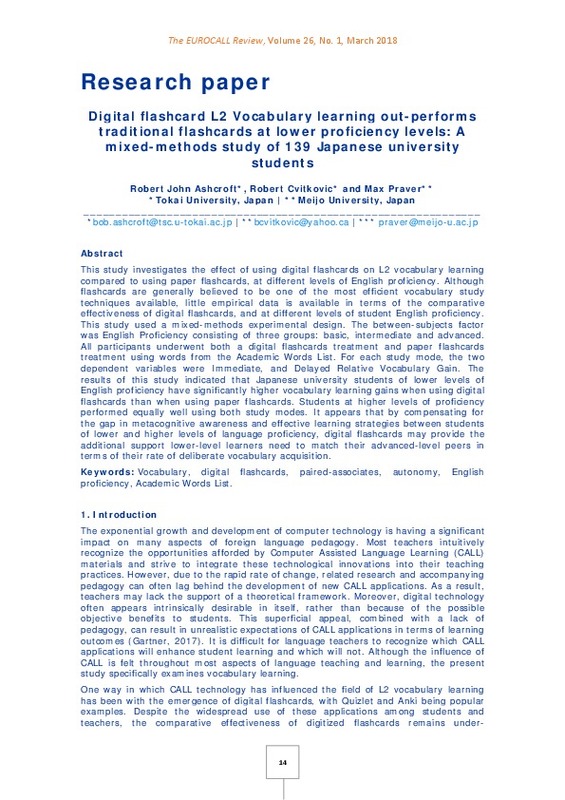Ashcroft, R. J., & Imrie, A. C. (2014). Learning vocabulary with digital flashcards. JALT2013 Conference Proceedings, 639-646. Retrieved from http://jalt-publications.org/proceedings/issues/2014-08_2013.1
Baddeley, A. D. (1990). Human memory: theory and practice. Hove: Erlbaum.
Cohen, A. D. (1993). Language learning: insights for learners, teachers, and researchers. Boston, MA: Heinle & Heinle.
[+]
Ashcroft, R. J., & Imrie, A. C. (2014). Learning vocabulary with digital flashcards. JALT2013 Conference Proceedings, 639-646. Retrieved from http://jalt-publications.org/proceedings/issues/2014-08_2013.1
Baddeley, A. D. (1990). Human memory: theory and practice. Hove: Erlbaum.
Cohen, A. D. (1993). Language learning: insights for learners, teachers, and researchers. Boston, MA: Heinle & Heinle.
Coxhead, A. (2000). A New Academic Word List. TESOL Quarterly,34(2), 213. doi: 10.2307/3587951
Cross, D., & James, C. V. (2001). A practical handbook of language teaching. London: Longman.
Elgort, I. (2010). Deliberate Learning and Vocabulary Acquisition in a Second Language. Language Learning,61(2), 367-413. doi: 10.1111/j.1467-9922.2010.00613.x
Gartner Your Source for Technology Research and Insight. (n.d.). Retrieved March 07, 2017, from http://www.gartner.com/technology/home.jsp.
Hirschel, R., & Fritz, E. (2013). Learning vocabulary: CALL program versus vocabulary notebook. System,41(3), 639-653.
Horst, M., Cobb, T., & Meara, P. (1998). Beyond A Clockwork Orange: Acquiring second language vocabulary through reading. Reading in a Foreign Language,11, 207-223.
Hughes, A. (2013). Testing for language teachers. Cambridge: Cambridge University Press.
Hulstijn, J. (2001). Intentional and incidental second language vocabulary learning: A reappraisal of elaboration, rehearsal, and automaticity. In P. J. Robinson (Ed.), Cognition and second language instruction (pp. 258-286). Cambridge: Cambridge University Press.
Laufer, B., & Shmueli, K. (1997). Memorizing New Words: Does Teaching Have Anything To Do With It? RELC Journal,28(1), 89-108. doi:10.1177/003368829702800106
Lees, D. (2013). A Brief Comparison Of Digital- And Self-Made Word Cards For Vocabulary Learning. Kwansei Gakuin University Humanities Review,18, 59-71. Retrieved June 2, 2017, from kwansei.repo.nii.ac.jp.
Nakata, T. (2008). English vocabulary learning with word lists, word cards and computers: implications from cognitive psychology research for optimal spaced learning. ReCALL,20(1), 3-20.
Nation, I. S., & Webb, S. A. (2011). Researching and analyzing vocabulary. Boston, MA: Heinle, Cengage Learning.
Nation, I. (2003). Effective ways of building vocabulary knowledge. ESL Magazine, 14-15.
Nation, I. (2005). Language education: Vocabulary. In I. C. Brown (Ed.), Encyclopaedia of language and linguistics (2nd ed., Vol. 6, pp. 494-499). Oxford: Elsevier.
Nation, I. (1995). Best practice in vocabulary teaching and learning. EA Journal, 7-15. Retrieved March 8, 2017, from http://www.victoria.ac.nz/lals/about/staff/publications/paul-nation/1995-Best-practice.pdf.
Nikoopour, J., & Kazemi, A. (2014). Vocabulary Learning through Digitized & Non-digitized Flashcards Delivery. Procedia - Social and Behavioral Sciences, 98, 1366-1373.
Puentedura, R. R. (2012, August 23). The SAMR Model: Background and Exemplars. Retrieved March 07, 2017, from http://www.hippasus.com/rrpweblog/archives/2012/08/23/SAMR_BackgroundExemplars.pdf.
Quizlet. (2017). Retrieved March 07, 2017, from https://quizlet.com.
Reinders, H., & White, C. (2011). The theory and practice of technology in materials development and task design. In N. Harwood (Ed.), English language teaching materials: theory and practice (pp. 58-80). Cambridge: Cambridge University.
Richards, J. C., & Schmidt, R. W. (2002). Dictionary of language teaching & applied linguistics. Harlow: Longman.
Soanes, C. (2010). The paperback Oxford English dictionary. Oxford: Oxford Univ. Press.
Suppes, P., & Crothers, E. J. (1967). Experiments in second-language learning. New York: Academic Press.
Webb, S. (2007). The Effects of Repetition on Vocabulary Knowledge. Applied Linguistics,28(1), 46-65. doi:10.1093/applin/aml048
[-]







![HTML file [HTML]](/themes/UPV/images/html.png)

